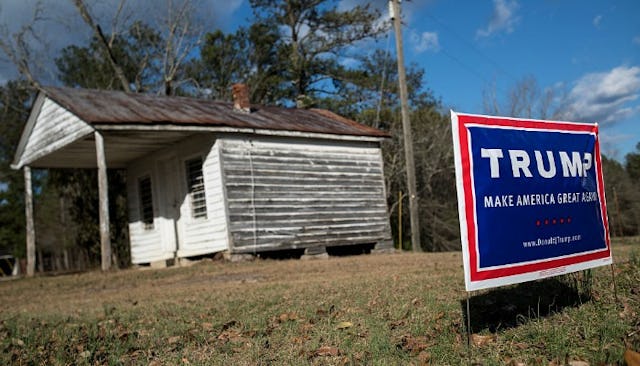When You're Raising Your Children In A Conservative Area

Our favorite hiking trail winds through wetlands and earthworks. I shudder when I see the long, tall walls of soil snaking through the swamp. In this place, in this state, I cannot stay silent. “These big hills were built by slaves,” I tell my 6-year-old. “They were sent to dig and drain the land, and many of them died of hunger and disease—diseases called malaria and yellow fever, which you catch from mosquito bites.” My son, unconsciously, scratches at his legs. “A white man told them what to do.”
Or we could go to the statehouse—built by slave labor, of course. Statues surround it, including one dedicated to the Father of Gynecology. He earned that title by operating on his slaves without consent. Other statues commemorate segregationists, slave owners, murderers. I do not take my sons to the statehouse. They visited for the first time during the flag protests. Take it down, we said, and we won. “History, not hate,” folks screamed at us from the other side of the pavement. They waved Confederate flags.
“That’s the slavery flag,” I have to tell my son. “It’s for men who like the fight to keep slavery legal.”
He nods. He hates the mention of slavery. He will put his hands over his ears, tell me to stop talking, tell me he knows about it, and can we please stop talking please. He has ancestors who fought for the Confederacy. He doesn’t know that yet.
Because of all this, as a white mother, I must tread carefully. I must make sure my children have diverse groups of friends. I must read them diverse books; we must seriously study other cultures. I must police their language.
We were talking about the kids in my 4-year-old’s YMCA class. One of them, he noted, was black. He didn’t know his name. “I call him ‘furry head,'” he said.
I choked on my sweet tea. “You can’t say that,” I said. “It says his hair is like an animal’s, and he is like an animal, and he is not an animal.”
“He didn’t care,” my son said, shrugging. But I imagined him caring. I imagined him telling his mother and her heart sinking. We went to the library. We checked out book after book by bell hooks, by Dinah Johnson. We went on a black hair unity study. Because in this state, in this place, my sons cannot denigrate black hair. They cannot be like everyone else.
Race relations aren’t the only things we must tread carefully about. We’re Catholic. In this place, we are a significant minority; many people don’t see us as Christian. As homeschoolers, we have to stay wary. A kind family might think we’re going to hell and try to evangelize my kids. I’ve been recommended curriculum that said Asian people were inbred; that the earth began several thousand years ago and fossils are the devil’s lies. We have to be careful, both talking about our collection of prehistoric shark teeth and with whom the kids play.
Even our secular homeschool group spent an entire lesson referring to black people as “Negros.” Luckily, we missed that history class, and I didn’t have to make a scene. Part of confronting racism, after all, is making a scene, and it’s uncomfortable and ugly and hard. We have to make lots of scenes down here in South Carolina. You’ve got to be ready at any time.
We’re also notoriously politically Conservative. I got cut off by a car with a Donald Trump sticker the other day and made the mistake of mentioning it. My son asked who Donald Trump is. I had to explain his odious politics, the reasons local people like him, and why he’s wrong. At least now my son says he likes Bernie Sanders because he thinks everyone should have free health care. I didn’t tell him how many people like Donald Trump. I couldn’t bear to.
There are other, more subtle, signs of the local Conservatism. We have a lot of country clubs, the kinds with pools and waiting lists. We don’t have the right last names for them. Little girls wear Lilly Pulitzer. The parks are full of nannies—nannies who are often a different color than their charges. Our sheriff spent huge sums of cash buying tanks (those black people might rise up, you know). Ask people about Hispanics, and they launch into a rant about illegal immigrants. Our favorite tiendas constantly close from immigration raids.
Once people find out about our fossils, our politics, and our political activities, I often see them edging in the other direction or finding another mom to talk to. When I complained about the “Negro” debacle, I was mostly met with puzzled looks. “Well, maybe she wanted to preserve the history during class,” a mother said. In normal T-shirts and jeans, without monograms or polos or overalls, my sons often don’t follow the unspoken dress code. I can see the judgmental wheels turning in other moms’ heads. I dare not wear a band T-shirt anymore.
It’s racist. It’s poor. It’s Conservative, and evangelical, and sometimes new earth creationist. I have to shield my young kids from a lot of ideas I don’t want them to encounter. But we’re halfway between the mountains and the beach. We have a killer children’s museum, a beautiful climate, and wonderful culture. And we love our liberal friends, mostly found through attachment parenting and the university. There’s a lot of crazy. There’s a lot of Confederate flags. But in the end, we love it enough to stay, to work for change. And to teach our children to.
This article was originally published on